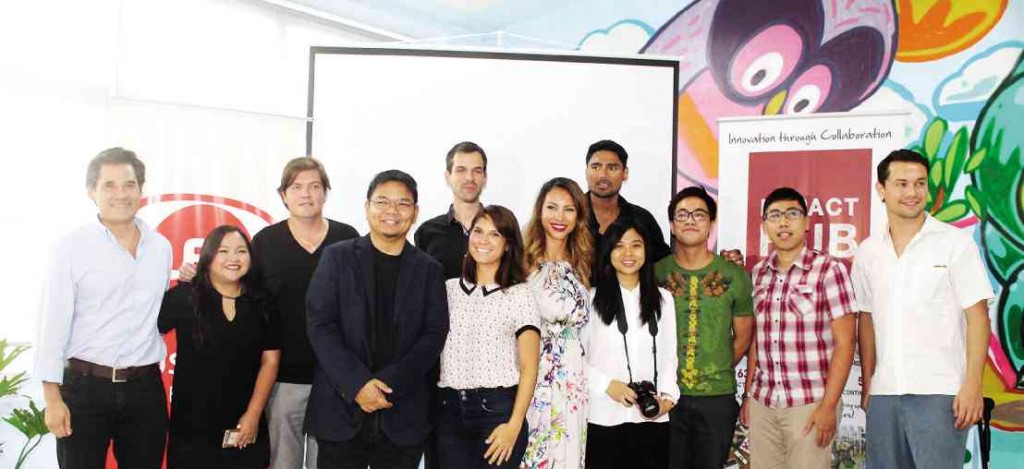Start-up firms on a quest to help solve traffic

IMPACT Hub Manila founders and staff, LBC Express Inc.’s Dino Araneta, and startup innovators at the fellowship launch in Makati City. PHOTOS BY MARK ANTHONY D. TOLDO
With traffic congestion at its peak in Metro Manila and mobile applications such as Uber, GrabTaxi and Waze on the rise in trying to ease burden on commuters, global business incubator Impact Hub Manila has stepped up to boost capability and fuel ingenuity among startups.
In partnership with local cargo and courier service provider LBC Express Inc., Impact Hub Manila recently launched the “Impact Hub fellowship on innovation in mobility,” a one-year incubation program for startups that focus on providing logistics and mobility solutions in the Philippines, particularly in Metro Manila.
“This (partnership) is something that is not usually done. We are supporting entrepreneurs without taking any (equity) shares to ensure the growth of the companies,” Impact Hub Manila co-founder LizAn Kuster said in a recent briefing.
The program is geared towards discovering innovations that could help alleviate, if not solve, logistics and transportation problems in the country.
“We are hopeful that entrepreneurs could come up with solutions. LBC is here not necessarily to benefit from their innovations but to guide them and share our expertise in providing logistics services,” LBC chief strategy and innovation officer Dino Araneta said.
The fellowship winner will take home at least P1 million worth of prizes including an intensive mentorship from industry experts, a 12-month living stipend and a free workspace at Impact Hub Manila office in Makati City.
Startups that have great ideas from anywhere in the world can apply online until Nov. 15, 2015.
Logistics and mobility in PH
Metro Manila traffic was recently dubbed as the “worst in the world” by traffic and navigation application Waze. Correspondingly, a study by the Japan International Cooperation Agency (Jica) estimated P2.5 billion daily losses to the local economy brought about by traffic congestion in the metropolis, that could rise up to P6 billion by 2030.
Even LBC operations are also affected by transportation problems. “If we have 80 to 90 percent delivery we’re good but due to traffic it goes down to 50%,” Araneta told the Inquirer.
Consequently, as “logistics is all about technology,” LBC is “definitely planning to incorporate advanced technology” with its services. It will also look into solutions brought by startups that could possibly fit with the company, he said.
Meanwhile, according to the 2014 World Bank report on Logistics Performance Index (LPI), the Philippines once again slipped to the 57th spot out of 160 countries in the world in terms of logistics and trade performance.
Efficiency of logistics networks and transportation system in a country are recognized as two of the key factors to economic development and global competitiveness.
So how can technology solve these problems? “The biggest revolution in mobility is happening with smartphones,” urban planner and Knight Foundation director Benjamin de la Peña said.
While the government considers the establishment of a mass subway system as a solution to traffic congestion, de la Peña believes efficient utilization of technology and information could be the key.
“Those who operate (mass transport vehicles) are only concerned on how to run the buses, not how to break information,” he said.
De la Peña further explained that innovations like digital maps must not only provide directions but also information that will help the public fully understand transport systems and how to “go around the city and what the options are in going into another city.”
Given such idea, De la Peña hinted on the convergence of technology and information as a possible strategy that innovators can integrate with their startups, to qualify to the incubation program.
The Inquirer met two startups that are vying for a spot in the program. They are the “Wave” and “Bambike.”
Startup hopefuls
“Wave” is a shuttle service booking mobile application that connects passengers with the same ride routes and commute schedule to shuttles that take them directly to their destination.
After inputting your ride details, wave will send a bus or van outside your village at the desired time. You can also book a ride for an entire week.
The app is yet to be launched in the market this October with the services offered at an affordable price.
“We’re pricing (the ride) higher than a bus but cheaper than taxi—that’s premium bus service yet affordable,” Wave Chief executive officer Nikolas Escobal said.
“We are passionate about sustainability and making the lives of Filipinos better. We hope to be part of this fellowship,” he added.
Meanwhile, joining the fellowship that provides an access to capital and mentorship “will surely be beneficial” to “Bambike” where they can “learn to grow the business more sustainably, rapidly and at scale,” Bambike founder Bryan McClelland said.
Bambike or bamboo bike is an eco-friendly, hand-made bicycle that is manufactured in a Gawad Kalinga community in Victoria, Tarlac.
Although he has yet to craft improvements and strategy on how bambike can be utilized in providing solutions to traffic situations, McClellan strongly believes “that bikes can be a real solution to transportation problems. We just need to address the safety concerns in infrastructure that are needed to have safe bike transport. Bike can be a vehicle for change. It does not only make bikers healthy, saves time (but also) contribute to a more sustainable city.”
McClellan is also looking at collaborating with a logistics solutions provider “that could integrate bambike into a larger overall logistical solutions” to meet the requirements of the fellowship program.














